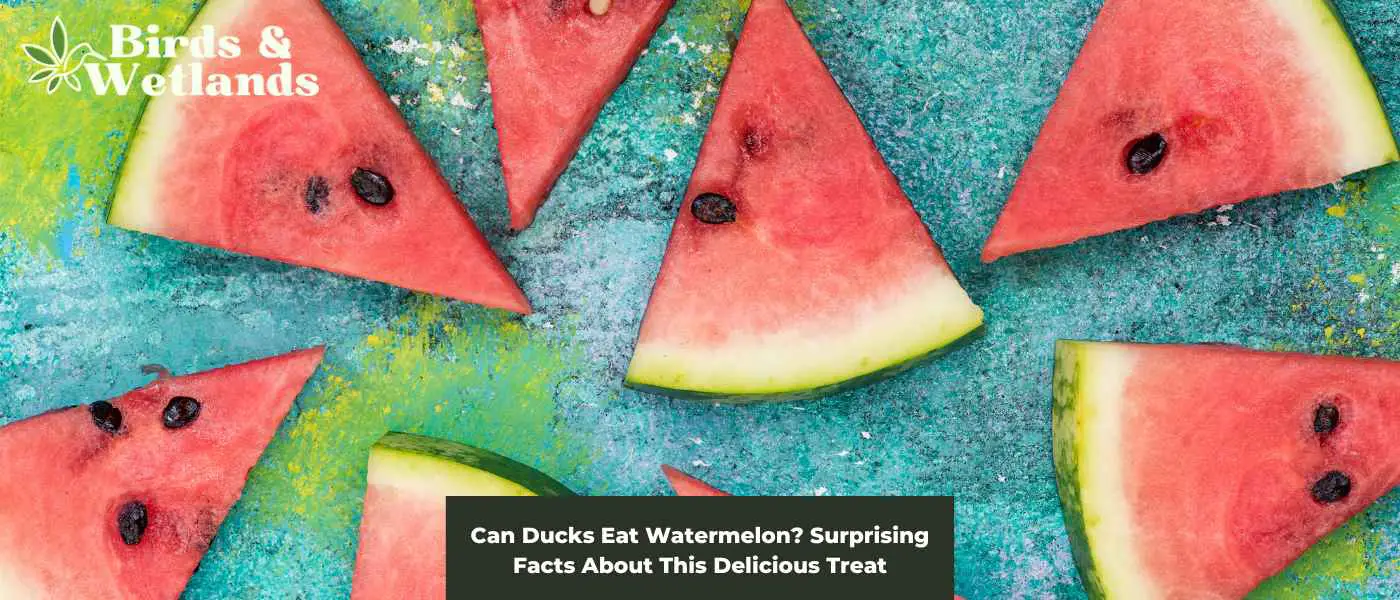Watermelon may be a refreshing summer treat for us humans, but what about our feathered friends? Do ducks have a taste for this juicy fruit?
Either way, you’re probably wondering: can ducks eat watermelon?
Yes, ducks can eat watermelon as an occasional treat. Watermelon is a hydrating and nutritious snack for ducks, providing vitamins, minerals, and antioxidants. Ensure that the watermelon is ripe and remove any seeds before cutting it into small, manageable pieces for easier consumption.
Key Takeaways on Can Ducks Eat Watermelon
- Ducks can safely eat watermelon in moderation.
- Watermelon is a great source of hydration for ducks, especially during hot weather.
- It is recommended to feed ducks small pieces of seedless watermelon.
- Too much watermelon can lead to digestive issues in ducks.
Can ducks eat watermelon seeds?
Giving watermelon seeds to ducks is an excellent way to provide them with supplemental nutrients. These seeds are a fantastic source of protein, healthy fats, and other critical vitamins and minerals. These small morsels are beneficial to wild ducks as part of their daily diet.
However, it is important for many duck owners to remember that moderation is key when feeding these seeds to your ducks. Too much of a good thing might harm their health and cause indigestion.
Too many seeds may cause digestive problems like bloating, constipation, or diarrhea. This occurs due to the high fat content in the seeds. While fats are a necessary component of a duck’s diet, an excessive amount can result in indigestion.
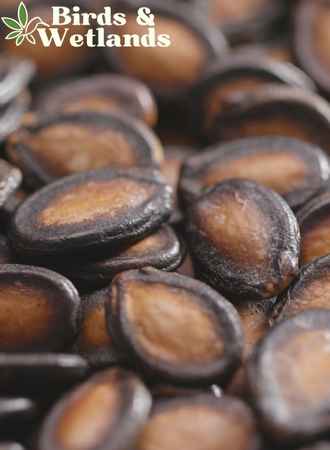
Will ducks eat watermelon rind?
Yes, ducks will eat watermelon rinds. In fact, many types of birds, including ducks, can benefit from eating a varied diet that includes fruits and vegetables.
The rind is a good source of hydration and nutrients for ducks, and it can provide a fun and nutritious treat for them to enjoy.
When serving watermelon rind or watermelon skin to ducks, it is best to cut it into small pieces to make it easier for them to eat and digest. Additionally, rather than throwing the rind away, serving it to ducks is a great way to reduce food waste and provide them with a nutritious snack.
Can baby ducks eat watermelon?
Yes, baby ducks can enjoy eating watermelons. Like adult ducks, young ducks can benefit from a varied diet, including fruits and vegetables.
Watermelon is a great source of hydration and nutrients for ducks of all ages, and it can make a delicious and refreshing treat for baby ducks to enjoy.
There are several benefits to feeding watermelon to baby ducks. For one, watermelon is high in vitamins and minerals, which can help support baby ducks’ overall health and growth. It is also a good source of hydration, especially for young ducks during the hot summer months.
Additionally, feeding baby ducks watermelon can give them mental stimulation, as they enjoy pecking at and exploring new foods.
When serving fresh and dried watermelons to baby ducks, it is important to cut it into small pieces to make them easier for them to eat and digest. Most duck owners can remove the excess seeds from the watermelon if you wish, as they may be difficult for baby ducks to digest. Removing the rind from the watermelon before giving it to baby ducks is also a good idea, as it may be too tough for them to eat.
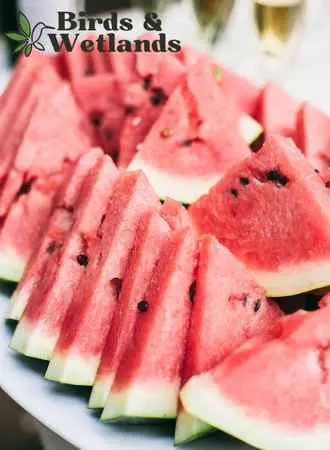
Are watermelons healthy for ducks?
Watermelons are a refreshing treat for humans on hot summer days and can also be a nutritious snack for ducks. Not only do watermelons provide hydration, but they are also packed with essential vitamins and minerals that can benefit a duck’s overall health.
- Vitamin A is important for maintaining healthy eyes, immune system, and skin health. It can also help with growth and development. Ducks deficient in this vitamin are often smaller than other ducks.
- Like in humans, vitamin C plays a crucial role in a duck’s body and immune system. It can help protect against infections, support healing and relieves stress, particularly heat stress.
- Watermelon treats are mostly made up of water, making them a great source of hydration for ducks. Ducks require proper hydration to maintain their energy levels and overall health.
- Watermelons contain antioxidants that protect the body against cell damage caused by free radicals and fight the reactive oxygen species that a ducks’ bodies produce. These free radicals can lead to the development of chronic diseases. Ducks can reduce their risk of developing certain health issues by consuming antioxidants. They also help ducks lay high-quality eggs.
- Magnesium is essential for maintaining a duck’s normal muscle, regulate blood temperature and nerve function and supporting a healthy immune system. Although magnesium has little effect on duck eggs,
- Potassium supplementation from watermelons is important for maintaining a duck’s normal heart function and regulating fluid and electrolyte balance.
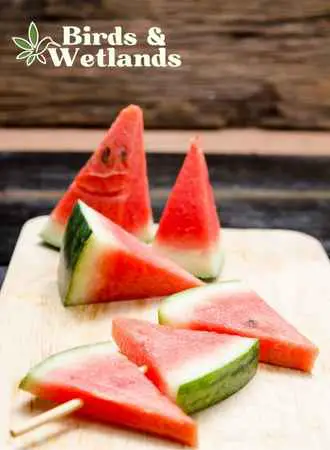
How to serve watermelon to ducks
You can feed watermelons to your ducks in various ways. Here are some tips on how you can safely feed watermelon to your flock:
- To prepare watermelon, cut up the delicious fruit into small cubes and scatter them into a shallow pool of water. Ducks can easily eat the cubes without struggling to get them out of the water.
- Defrost frozen watermelon before cutting them into smaller pieces. Scoop the watermelon flesh out of the rind to create a bowl-shaped rind.
- Slice the watermelon into thin strips and hang them off tree branches close to the water. When ducks visit, they’ll have easy access to the fruit treat!
- It is okay to feed dried watermelons to ducks too!
- Shred up some pieces of watermelon and place them on a flat surface near the pond or lake where ducks often visit. The texture is easy for their beaks to pick up and take away with them.
- Mash up some ripe watermelon in a bowl and serve it in an open container that ducks can easily enjoy from a floating platform or dock nearby.
- Place large slices of fresh watermelon on lily pads around your pond or lake for ducks to enjoy as part of their morning breakfast routine.
- On a hot summer day, freeze slices or cubes of tasty watermelon and place them in shallow bodies of cool, clear pond water near areas where ducks typically congregate – they’ll love taking refreshing bites out of this cold treat!
- Incorporate small chunks and pieces of cut-up fresh or frozen seedless watermelons into your duck’s feed or make a fruit salad and scatter it around the pond or lake area so hungry ducks can find it throughout their day-to-day activities in search of food!
- Create a blended watermelon juice by blending up some cut-up seedless watermelons and other fruits with ice cubes in a food processor – spread this mixture throughout your backyard areas where you frequently see duck visitors so they can enjoy this cool snack!
- Mix cut-up watermelons with table scraps, leafy greens and other vegetables such as lettuce, edible flowers, cabbage and kale. While you can feed your duck spinach, it’s best to avoid it due to its moderate oxalic content.
- Ducks eat cucumbers, so you can mix them with fresh watermelons.
How often can ducks eat watermelon
Watermelon is a delicious and healthy summer treat that can be enjoyed by people and ducks alike. However, as with any food, moderation should be exercised when feeding watermelon to ducks.
Ducks should only eat watermelon occasionally and in small amounts. Too much of this refreshing fruit can cause digestive issues in ducks due to its high natural sugars.
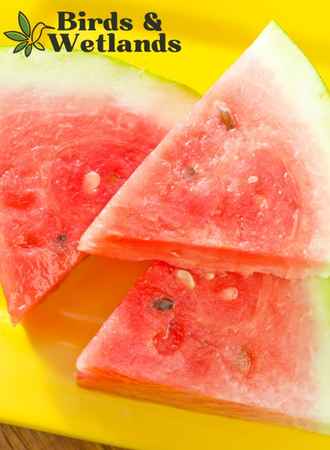
Similar Foods for Ducks
| Apples | Can Ducks Munch on Apples? |
| Bananas | Are Bananas Good for Ducks? |
| Blueberries | Feeding Ducks Blueberries |
| Cantaloupe | Cantaloupe Treats for Ducks |
| Cherries | Can Ducks Enjoy Cherries? |
| Grapes | Are Grapes Safe for Ducks? |
| Lemons | Sour Citrus for Ducks? |
| Mango | Tropical Delight for Ducks |
| Oranges | Citrus Treats for Ducks |
| Peaches | Juicy Peaches for Ducks |
| Pears | Pears: A Duck’s Delight? |
| Strawberries | Strawberry Treats for Ducks |
| Tomatoes | Can Ducks Eat Tomatoes? |
| Watermelon | Refreshing Watermelon for Ducks |
Best Duck Feed Pellets
Are you a duck owner looking for the perfect feed to keep your feathered friends happy and healthy? Look no further than Purina Duck Feed Pellets! With their nutritionally balanced formula and high-quality ingredients, these pellets are the ultimate solution for providing your ducks with the nutrition they need to thrive.
Pros
- Complete Nutrition: Purina Duck Feed Pellets are nutritionally balanced to provide all the essential vitamins and minerals that ducks need to stay healthy and strong.
- Easy to Digest: The pellets are specially formulated to be easy to digest, which makes them ideal for ducks of all ages.
- Promotes Growth and Development: With its balanced nutrition formula, Purina Duck Feed Pellets are designed to support healthy growth and development in ducks.
- Suitable for All Breeds: Whether you have domestic ducks or wild ducks, Purina Duck Feed Pellets are suitable for all breeds of ducks.
- Trusted Quality: Purina has been producing high-quality animal feed for over 100 years, so you can trust that your ducks are getting the best possible nutrition with Purina Duck Feed Pellets.
Cons
- Cost: Compared to other types of duck feed on the market, Purina Duck Feed Pellets can be slightly more expensive. However, many customers feel that the high-quality ingredients and balanced nutrition formula are worth the extra investment.
- Pellet Size: Some customers have noted that the pellet size of Purina Duck Feed Pellets can be quite large, which may not be suitable for smaller or younger ducks. However, many customers have reported that the pellets can easily be broken up or soaked in water to make them easier to eat.

